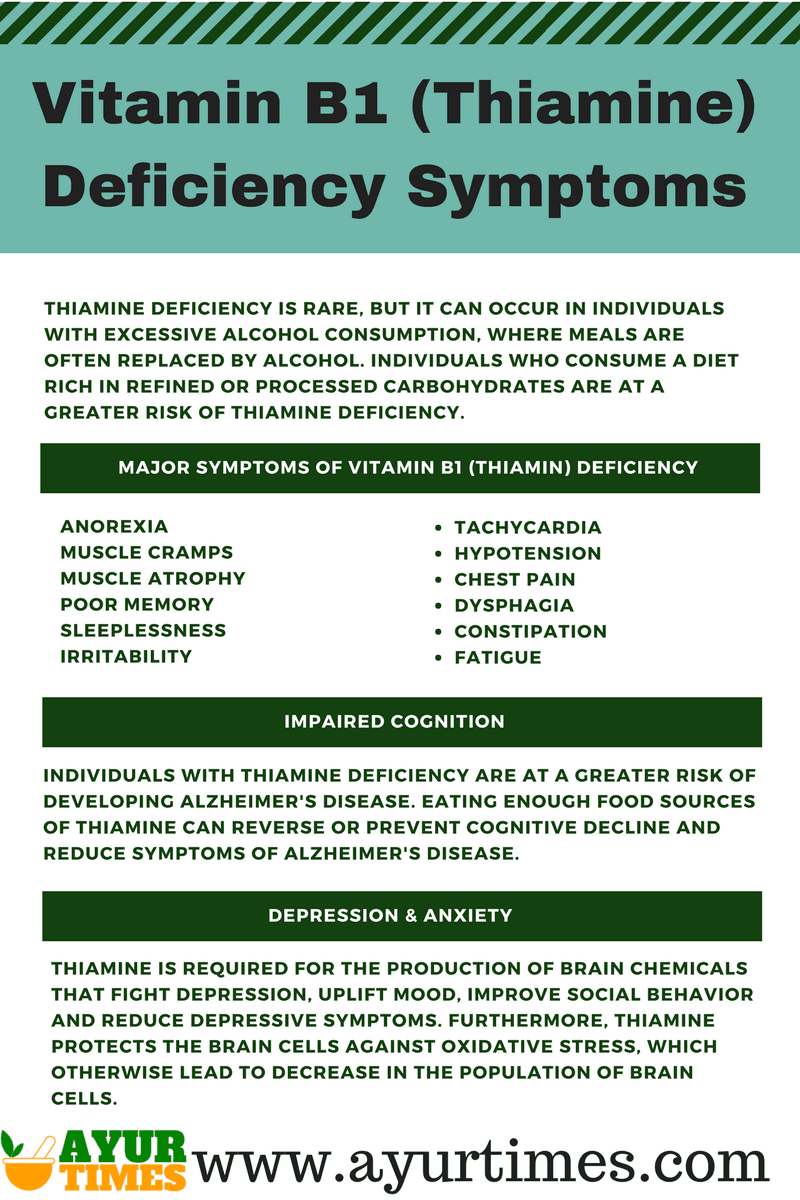
Since low levels of thiamine are easy to diagnosis using a blood test and the treatment options are very simple theres no reason for anyone to ever suffer permanent brain or neurological disorders due to a deficiency. Fatigue may occur gradually or suddenly.

If left untreated thiamine.
Signs of low thiamine. 11 Signs and Symptoms of Thiamine Vitamin B1 Deficiency 1. One common early symptom of thiamine deficiency is a loss of appetite or anorexia. Fatigue may occur gradually or suddenly.
It can range from a slight decrease in energy to extreme. Thiamine deficiency symptoms. Feeling run down can be a sign of stress poor sleep or it could be a lack of thiamine in your diet.
If youre constantly battling fatigue you might want to talk to. Symptoms of Thiamine Deficiency. While thiamine deficiency is said to be rare in developed countries such as here in the US there is likely a much larger subclinical deficiency population due to the wide range of symptomology that may be present.
To put it simply thiamine is needed to turn what you eat into energy ATP. Because of the foundational importance of thiamine in the body the. Thiamine helps decrease the risk for developing the specific brain disorder called Wernicke-Korsakoff syndrome WKS.
WKS symptoms include involuntary muscle movement nerve damage lethargy and trouble walking. This brain disorder is related to low levels of thiamine and is often seen in alcoholics especially those who have poor diets as well. This is because some of its symptoms could be confused with other problems like routine fatigue.
Wet beriberi affects your cardiovascular system. You may see one or more of these signs of the thiamine deficiency resulting in wet beriberi. RefEssa Essa Michael R.
Velez Sakima Smith Shivraman Giri Subha V. Raman and Richard J. Low thiamine levels can lead to prolonged blood diseases along with neurological issues such as vertigo.
Feeling dizzy when going from a seated position to standing up is a common symptom because thiamine deficiency can affect the nervous system. Thiamine is used to treat thiamine deficiency which when severe can prove fatal. In less severe cases non-specific signs include malaise weight loss irritability and confusion.
Well-known disorders caused by thiamine deficiency include beriberi WernickeKorsakoff syndrome optic neuropathy Leighs disease African seasonal ataxia or Nigerian seasonal ataxia and central pontine. Williams and his associates Williams R. M and Smith B.
Observations on Induced Thiamine Deficiency in Man Arch. Med66785 Oct 1940 showed that definite deficiency symptoms would develop in otherwise normal adults kept on a daily intake of 015 mg. For several months while it is generally presumed that 2 to 3 mg.
Daily will cover the normal. One of the most common symptoms of a thiamine deficiency is a lack or loss of appetite. It seems the part of the brain that affects appetite is altered when there is a thiamine deficiency.
When individuals have a deficiency in thiamine their body thinks it is full or satisfied when it is not. This causes less food to be eaten weight loss and potential eating disorders. If an individuals body is telling them it does not.
Seek prompt medical care if you suspect you might have thiamine deficiency or if you have symptoms of thiamine deficiency including numbness or tingling possibly accompanied by weakness clumsiness confusion or difficulty thinking or symptoms of congestive heart failure such as swelling in your legs and shortness of breath. Symptoms of thiamine deficiency or a lack of vitamin B1 include fatigue irritability depression and stomach problems. Thiamine deficiency is not common.
However people with Crohns disease or anorexia those undergoing kidney dialysis and people with alcoholism are at. The same applies to neuropathic symptoms particularly in the distal extremities. Neurologic symptoms of thiamine deficiency are as follows 11.
Poor memory irritability sleep disturbance. Thiamine is a heat-labile and water-soluble essential vitamin belonging to the vitamin B family with antioxidant erythropoietic mood modulating and glucose-regulating activitiesThiamine reacts with adenosine triphosphate to form an active coenzyme thiamine pyrophosphate. Thiamine pyrophosphate is necessary for the actions of pyruvate dehydrogenase and alpha-ketoglutarate in carbohydrate.
Since low levels of thiamine are easy to diagnosis using a blood test and the treatment options are very simple theres no reason for anyone to ever suffer permanent brain or neurological disorders due to a deficiency. Furthermore you cannot overdose on Thiamine so if theres even a suspicion of deficiency the patient should be given treatment immediately. If left untreated thiamine.
Acute deficiency can present as Wernicke encephalopathy with ocular abnormalities mental state changes and ataxia.